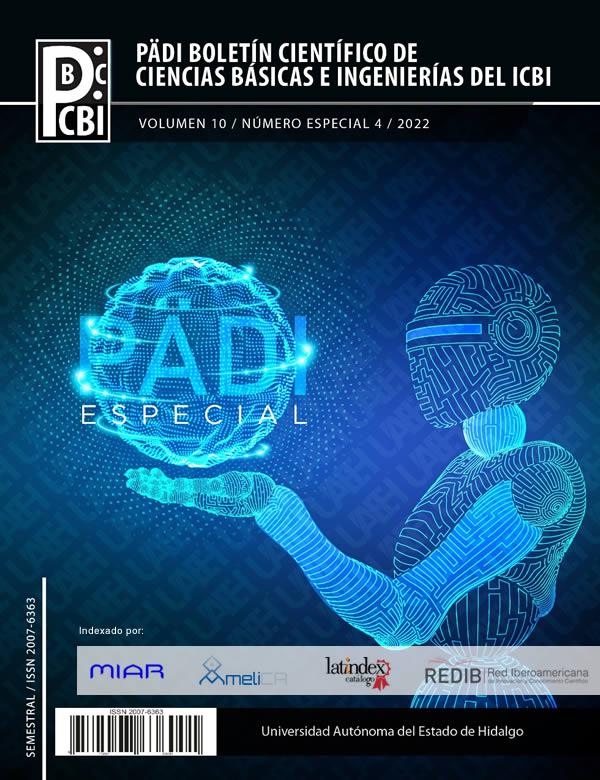Probabilistic inference of events associated with COVID-19 in Mexico
Abstract
Currently, the Mexican population is unknown of the probability of presenting aggravating events (intubation, admission to the intensive care unit, and death) derived from COVID-19. Several authors has proposed probabilistic graphical models for identify the factors associated to this disease. In this document, we propose to use Bayesian networks to identify probabilistic dependency relationships in 23 study variables from the COVID-19 open data set, provided by the Dirección General de Epidemiología in Mexico during the period 2020 and 2021. Bayesian network models were generated through structural learning algorithms: PC and Hill Climb Search. The results made it possible to determine that diabetes, hypertension and obesity are the main factors that affect aggravating events of COVID-19. Likewise, the probability of death depends on the patient's age group and whether or not he was intubated. The Bayesian network as a classifier obtains at least 94% precision and accuracy when classifying aggravating events of COVID-19.
Downloads
References
Ankan, A., & Panda, A. (01 de 04 de 2015). pgmpy: Probabilistic graphical models using python. Citiseer. pgmpy: https://pgmpy.org/
CONACYT. (01 de 04 de 2022). CONACYT. Proyectos: https://salud.conacyt.mx/coronavirus/investigacion/proyectos/exploratorios.html
de Terwangne, C., Laouni, J., Jouffe, L., Lechien, J. R., Bouillon, V., Place, S., Capulzini, L., Machayekhi, S., Ceccarelli, A., Saussez, S., & Sorgente, A. (2020). Predictive accuracy of covid-19 world health organization (Who) severity classification and comparison with a bayesian-method-based severity score (epi-score). Pathogens.
DGE. (01 de 04 de 2022). Datos Abiertos Dirección General de Epidemiología. Datos Abiertos Dirección General de Epidemiología: https://datosabiertos.salud.gob.mx/gobmx/salud/datos_abiertos/datos_abiertos_covid19.zip
Fenton, N. E., Neil, M., Osman, M., & McLachlan, S. (2020). COVID-19 infection and death rates: the need to incorporate causal explanations for the data and avoid bias in testing. Journal of Risk Research, 862-865.
Gámez, J. A., Mateo, J. L., & Puerta, J. M. (2011). Learning Bayesian networks by hill climbing: efficient methods based on progressive restriction of the neighborhood. Data Mining and Knowledge Discovery, 106-148.
Gobierno de México. (31 de 12 de 2021). Covid-19 México. Covid-19 México: https://datos.covid-19.conacyt.mx/
Gobierno de México. (02 de 08 de 2021). Guía clínica para el tratamiento de la COVID-19 en México. Guía clínica para el tratamiento de la COVID-19 en México: https://coronavirus.gob.mx/wp-content/uploads/2021/08/GuiaTx_COVID19_ConsensoInterinstitucional_2021.08.03.pdf
Liu, Z., Malone, B., & Yuan, C. (2012). Empirical evaluation of scoring functions for Bayesian network model selection. BMC bioinformatics, 1-16.
Neath, A. A., & Cavanaugh, J. E. (2012). The Bayesian information criterion: background, derivation, and applications. Wiley Interdisciplinary Reviews: Computational Statistics, 199--203.
Ojugo, A., & Otakore, O. D. (2021). Forging An Optimized Bayesian Network Model With Selected Parameters For Detection of The Coronavirus In Delta State of Nigeria. Journal of Applied Science, Engineering, Technology, and Education, 37-45.
OMS. (10 de 11 de 2020). Información basíca sobre la COVID-19. Información basíca sobre la COVID-19: https://www.who.int/es/emergencies/diseases/novel-coronavirus-2019/question-and-answers-hub/q-a-detail/coronavirus-disease-covid-19
OMS. (01 de 01 de 2022). WHO Coronavirus (COVID-19) Dashboard. WHO Coronavirus (COVID-19) Dashboard: https://covid19.who.int/
OPS. (01 de 04 de 2022). Preguntas frecuentes: Vacunas contra la COVID-19. Preguntas frecuentes: Vacunas contra la COVID-19: https://www.paho.org/es/vacunas-contra-covid-19/preguntas-frecuentes-vacunas-contra-covid-19#:~:text=%C2%BFExiste%20una%20vacuna%20contra%20la,Otras%20vacunas%20contin%C3%BAan%20siendo%20estudiadas.
OPS. (01 de 04 de 2022). Variantes del SARS-COV-2 (COVID-19) - Preguntas frecuentes. Variantes del SARS-COV-2 (COVID-19) - Preguntas frecuentes: https://www.paho.org/es/variantes-sars-cov-2-covid-19-preguntas-frecuentes
Scutari, M. (2016). An Empirical-Bayes Score for Discrete Bayesian Networks. En Conference on probabilistic graphical models (págs. 438--448). PMLR.
Scutari, M., & Denis, J.-B. (2021). Bayesian networks: with examples in R. Chapman and Hall/CRC.
Secretaría de Salud. (28 de 02 de 2020). 077. Se confirma en México caso importado de coronavirus COVID- 19. 077. Se confirma en México caso importado de coronavirus COVID- 19: https://www.gob.mx/salud/prensa/077-se-confirma-en-mexico-caso-importado-de-coronavirus-covid-19
Secretaría de salud. (01 de 04 de 2022). Triage respiratorio en atención primaría. Dirección General de Calidad y Educación en Salud: http://www.calidad.salud.gob.mx/site/docs/triage_respiratorio_atencion_primaria.pdf
Spirtes, P., Glymour, C. N., Scheines, R., & Heckerman, D. (2000). Causation, prediction, and search. MIT Press.
Wei, J., Li, Y., & Nie, Y. (2020). A risk assessment system of COVID-19 based on Bayesian inference. Journal of Physics: Conference Series.













